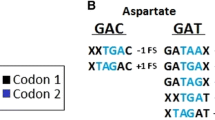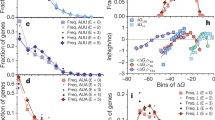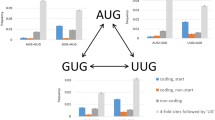Abstract.
Natural selection favors certain synonymous codons which aid translation in Escherichia coli, yet codons not favored by translational selection persist. We use the frequency distributions of synonymous polymorphisms to test three hypotheses for the existence of translationally sub-optimal codons: (1) selection is a relatively weak force, so there is a balance between mutation, selection, and drift; (2) at some sites there is no selection on codon usage, so some synonymous sites are unaffected by translational selection; and (3) translationally sub-optimal codons are favored by alternative selection pressures at certain synonymous sites. We find that when all the data is considered, model 1 is supported and both models 2 and 3 are rejected as sole explanations for the existence of translationally sub-optimal codons. However, we find evidence in favor of both models 2 and 3 when the data is partitioned between groups of amino acids and between regions of the genes. Thus, all three mechanisms appear to contribute to the existence of translationally sub-optimal codons in E. coli.
Similar content being viewed by others
Author information
Authors and Affiliations
Additional information
Received: 18 July 2000 / Accepted: 17 April 2001
Rights and permissions
About this article
Cite this article
Smith, N., Eyre-Walker, A. Why Are Translationally Sub-Optimal Synonymous Codons Used in Escherichia coli?. J Mol Evol 53, 225–236 (2001). https://doi.org/10.1007/s002390010212
Issue Date:
DOI: https://doi.org/10.1007/s002390010212




